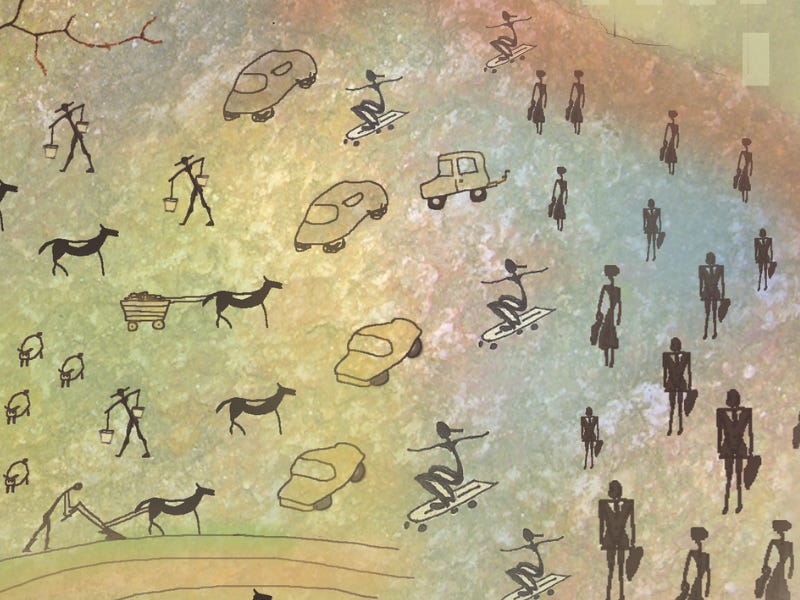We can't air-condition our way out of this one
It's time to take climate change to heart and put our talk into action
We are living in the Anthropocene Era.
You might remember from school the Cenozoic Era, the era of mammals that lasted 66 million years, or the Holocene Epoch, the 11,000 years since the last ice age. The Anthropocene is a term you’ll see more and more often, as scientists and historians recognize humankind as a global geological force.
This probably seems a long way from Home Ecology, the title of this newsletter, which probably makes you think of shopping bags and organic labels. When I first started writing about home ecology - also called green lifestyles or eco living - I was not thinking about the whole history of humanity. That was 30 years ago, when I was a young mother working part-time for T. S. Eliot’s widow. Today, as wildfires and drought sweep many parts of the world, my aim is to connect the dots and make the case that we all need to act, and act now.
But not by turning our lives upside down. There is a book about preparing for climate change that opens with a chapter about where to move (in the US only, of course). I’m going to start at home, where we are now, and propose some smaller changes first.
I was at a barbecue a couple weeks ago and the conversation turned to driving. It was an affluent Massachusetts crowd so no one was agonizing over gas prices. One person kicked off reminiscences by saying, “I remember the lines at the gas station when I was a kid.”
“And my dad was always turning off the lights,” said someone else.
“I remember wearing sweaters, and using extra blankets.”
The memories flowed. Then a woman asked, “Is that what things are coming to? Are we going back to the seventies?”
“Yes!” I said.
These friends are people who buy organic food, carry water bottles, and want their town to have “green” energy. Some of them drive electric cars.
But they don’t see that life ahead will be different.
Part of this is being American. We were sheltered from World War II, while Europeans and Asians were dying in their own backyards. Our wars have been fought at a distance, and we still buy more, spend more, use more of virtually everything, per capita, than any other people on earth. And we Americans have been brainwashed to think there is a technological solution to every problem.
I’ve been reading the news from China (where rivers are drying up) and from Europe. Economist Paul Krugman wrote this week about European energy supply and demand and government intervention:
Even among people with similar incomes, some will live in houses with good insulation and low energy bills, others in drafty, energy-guzzling buildings. In the long run, policy should encourage everyone to upgrade their personal energy efficiency, but in the long run we are all, well, not dead, but quite possibly impoverished in the face of this gigantic price shock.1
President Macron of France had the courage to say:
What we are currently living through is a kind of major tipping point or a great upheaval … we are living the end of what could have seemed an era of abundance … the end of the abundance of products of technologies that seemed always available … the end of the abundance of land and materials including water.2
As chief heat officer of Athens, Eleni Myrivili, said: “We can’t air-condition our way out of this.”3
Late breaking news: “Portugal and Spain were among the first European nations to build the kind of processing terminals needed to accept boatloads of natural gas in liquefied form and to convert it back into the vapor that could be piped into homes and businesses.”4 Of course this is still reliance on fossil fuels, contributing to global warming (aka climate change). But let's be realistic: our friends in Europe merit winter heat just as much as we do. This is a time for solidarity, and shared sacrifice.
What you can do today
I’m going to keep this simple, and focused only on energy today. (Later, I will be writing about other issues we should keep in mind, including water and biodiversity.)
Turn the air-conditioning up by a couple of degrees. Make sure windows are fully closed if you are running a/c. Wear a lighter shirt or dress. You might even try pulling down the shades during the day, putting on some fans, and turning the a/c off!
Not to be hemisphere-centric, this might be turning the heating down a little, or putting on a sweater. Maybe make it a cardigan, in honor of President Jimmy Carter, who got slammed during that energy crisis of 1979 for suggesting that manly Americans (Carter was a Navy veteran) could actually wear a cardigan sweater.
I could write more about the connection between gas-guzzling and masculinity, but I think I’ll leave you to ponder that one!
Finally, to keep it international, here are some home ecology tips in Chinese.
Coming next
Q&A My garden is drying up!
Q&A Do I have to give up meat?
Q&A Should I buy an electric car?
Stay tuned, send me your burning questions, and please tell a few friends about Home Ecology.
“Europe’s Gonna Party Like It’s 1979” in the New York Times.
“Can cities adapt to an era of extreme heat?” in the Financial Times.
“Portugal Could Hold an Answer for a Europe Captive to Russian Gas” in the New York Times.





I am as a young geolog from remote area di Papua. I say thank you so much about this article. It is good article.